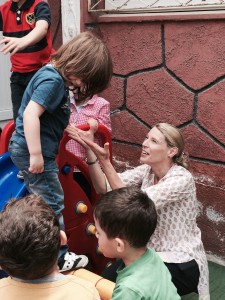Syrian children across the region have it very tough. There are now almost three million refugees who have fled Syria since the war started more than three years ago and an estimated 50% of them are children. They spread across five countries, with the highest number in Lebanon—nearly 1 million refugees living there in informal camps and in towns and cities. The country with the second highest number of displaced Syrians is Turkey, where most refugees live along a border that has not only geographic but cultural, historic, and economic ties with Syria.
 Children here face many challenges, including the fact that most older children cannot go to school because they don’t speak Turkish. Families move constantly, trying to find work to make enough to feed themselves. But the children who have it toughest are those who are orphaned or are unaccompanied and living with extended family. Being a Syrian orphan means your father has died and thus you and your mother likely do not have any support unless family members or aid steps in to help.
Children here face many challenges, including the fact that most older children cannot go to school because they don’t speak Turkish. Families move constantly, trying to find work to make enough to feed themselves. But the children who have it toughest are those who are orphaned or are unaccompanied and living with extended family. Being a Syrian orphan means your father has died and thus you and your mother likely do not have any support unless family members or aid steps in to help.
We found a special kind of support for these children when we visited a local school. An amazing woman we met, Rana*, runs a school for orphaned Syrian children living in Antakya, giving them a bright and cheery school in which to spend their time with instruction in their native Arabic and, importantly, tutoring in Turkish and English as well. The school swells with up to 300 children in a tiny three-story house when school is in full session. When we visited, it was the start of summer vacation so there were about 60 children ages 4 through 13. Most of the children were smiling and playful, though painfully there were a few who hung back and only looked at us with sad eyes when we tried to play and smile with them. All of them had lost at least one parent—some both—and had been taken in by aunts, uncles or neighbors coming from Syria.
Save the Children is supplying some emergency aid to the school in the form of summer clothes and shoes, as well as school materials, but it’s not enough. Rana struggles to find support for the school, needing to pay the rent, teacher salaries, cost of instructional materials, and transportation costs to allow the children to get across town to attend. She is also raising two disabled boys as well as two other children and, despite those challenges, she raises much of the funding for the school herself. Her selflessness makes her school a bright spot for children who have been through so much, and still face so many challenges.
As we ended our visit, one of the youngest girls posed proudly outside the school as the bus pulled up to take her home. Rana and her teachers stood on the curb ready to help the children onto the bus. It was an ideal picture of happy student and steadfast teacher—but the circumstances are far from ideal. I hope on my next trip back to Turkey I can see Rana’s work with children grow even stronger thanks to greater support for the Syrian refugees now living in Turkey.
*Names have been changed.

